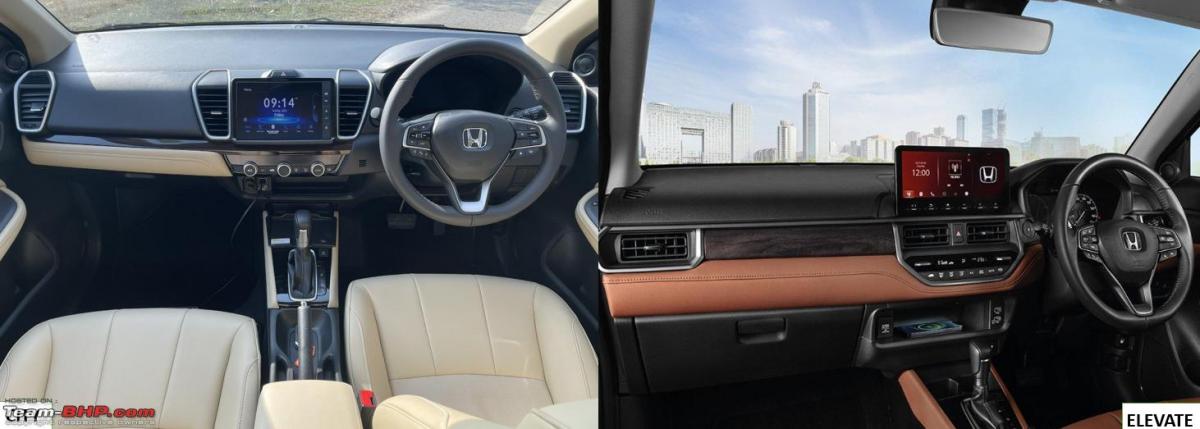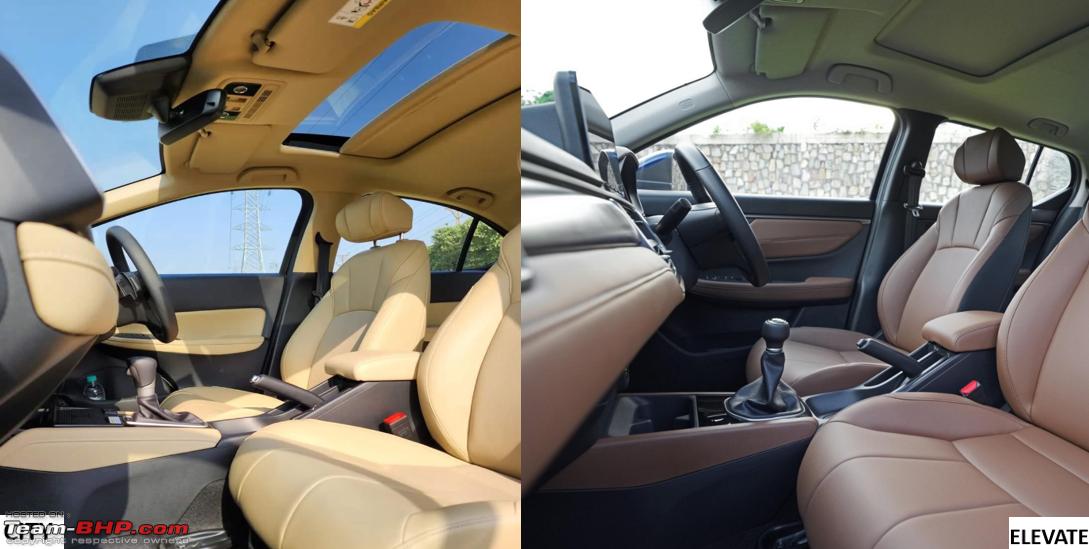Honda Elevate vs Honda City: A comparision of features, space & more
This compact SUV shares its foundation with the well-established Honda City, but it’s designed with a unique SUV style.
BHPian Motor_Dev recently shared this with other enthusiasts.
Comparison | Honda City vs. Honda Elevate
Introduction
Honda has recently introduced a fresh addition to its lineup, the Elevate SUV. This compact SUV shares its foundation with the well-established Honda City, but it’s designed with a unique SUV style. For quite some time, the Honda City has held a prominent position as one of Honda’s flagship models in India. Now, the question that arises is whether the new Elevate outperforms the City. Below, I compare the Honda City with the Honda Elevate across various parameters.
Dimensions
There are some differences in the dimensions of the City and Elevate. The City measures 4583 mm in length, 1748 mm in width, and 1489 mm in height. In contrast, the Elevate’s dimensions are 4312 mm in length, 1790 mm in width, and 1650 mm in height. Additionally, the City has a ground clearance of 165 mm, which is less than the Elevate’s substantial 220 mm. When it comes to boot space, the City offers a larger capacity of 506 litres compared to the Elevate’s 458 litres. The wheelbase of the City measures 2600 mm, while the Elevate boasts a larger wheelbase at 2650 mm.
Exterior Changes
Design
While the City presents a sleek and elongated profile with a clean and elegant appearance, the Honda Elevate shows a boxy yet sophisticated silhouette. It looks more like a stretched-out hatchback than a regular SUV. Both cars have simple designs that are expected to stay attractive for a long time.
Front
In the front of the City, you’ll find a honeycomb grille along with a chrome strip. The front bumper has a sporty appearance, and there’s a tasteful carbon fibre finish on the chin, which isn’t overly done. On the other hand, the Elevate features a larger grille with a chrome strip, albeit smaller than the City’s. The substantial grille has a commanding presence. The bumpers have a neat appearance, and underneath, there’s a faux skid plate. Overall, the front end of both cars looks impressive.
Rear
The rear of the City has a sporty appearance with a lid spoiler and a sporty rear bumper. The bumper has a slim design, featuring a blacked-out lower portion, and similar to the front, there are carbon-fibre elements used here. In contrast, the rear of the Elevate adopts a more straightforward, simplistic look with many straight-line elements. It comes with connected tail lamps. The rear bumpers have a clean design with minimal details, and like the front, there’s also a faux skid plate. Overall, both rear designs look good.
Side
The side profile of the City looks elegant, resembling that of a D-segment sedan, giving it a premium appearance. On the other hand, the Elevate’s side profile appears boxy, with a straight roofline and squared-off wheel arches that give it a sturdy stance. However, it resembles a stretched hatchback from the side rather than a typical SUV. Overall, the City’s side profile looks a tad more premium, but there’s no significant issue with the Elevate’s side profile either.
Interior
Dashboard and Cabin
The City boasts a delightful interior ambience with an overall premium cabin look and feel. The presence of leather inserts adds a nice touch. Its interior design is straightforward and follows a beige and black theme, which looks very premium. Inside the Honda Elevate, you’ll discover a clean dashboard design with straight lines, much like its exterior appearance. The interior adopts a black and tan theme, which complements the overall feel of the cabin.
Front Seats
Both the cars have similar front seats. The front seats are comfortable in both the cars but lack ventilation. They’re soft enough for long drives.
Rear Seats
In the City, you’ll find good legroom and knee room, suitable for three adults, although there might be a slight concern about headroom. However, it lacks adjustable headrests. On the other hand, the Elevate offers good legroom, knee room, and headroom. It also comes with adjustable headrests for the side passengers in the rear. However, it lacks a headrest for the middle passenger and surprisingly does not have a 3-point seat belt for the middle passenger, a feature present in the City. The Elevate is better suited for accommodating two adults rather than three.
Instrument Cluster
Both cars share a similar instrument cluster, which includes a traditional analogue speedometer combined with a 7-inch digital screen. This digital screen provides a range of information, including details on fuel consumption, trip information, outside temperature, and more.
Infotainment System
The Honda City features an 8-inch infotainment system that might seem a bit outdated, sporting an older interface and a somewhat uninspiring design. While it does offer wireless connectivity, its overall design might not be very appealing. On the other hand, the Elevate offers a user-friendly 10.25-inch touchscreen infotainment system that’s responsive and easy to navigate. It also comes with physical buttons for added convenience and provides wireless connectivity, delivering a more modern and enjoyable tech experience.
Speakers
Both the Honda City and the Elevate come equipped with the same 8-speaker audio system, providing clear and high-quality sound even at high volume levels. The audio quality is good in both cars.
Continue reading BHPian Motor_Dev’s comparision of the Honda Elevate and City for more insights and information.
Source: Read Full Article













